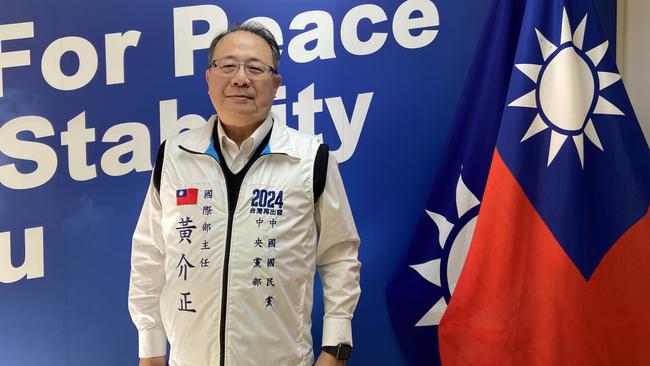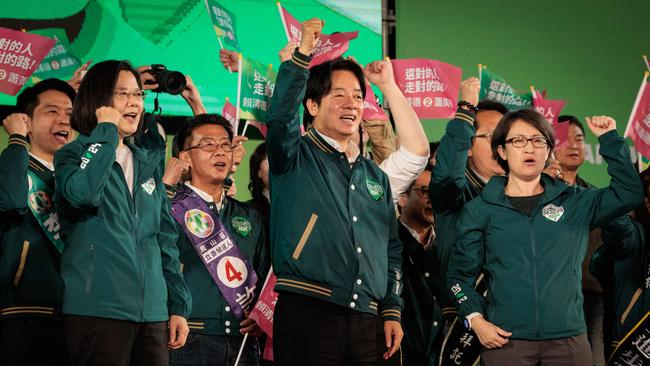KMT victory would ‘buy time for AUKUS and Taiwan democracy’
Taiwan’s main opposition party says winning this Saturday’s election would reduce the chances of a catastrophic war in the Indo-Pacific and ‘buy time’ for Australia’s AUKUS submarines.

Taiwan’s main opposition party says its victory at this Saturday’s election would reduce the chances of a catastrophic war in the Indo-Pacific, “buy time” for Australia’s AUKUS submarines and help the island democracy of 23 million people “outlive Xi Jinping”.
One of the top foreign affairs and national security advisers to the Kuomintang (KMT) said a victory by the party’s presidential candidate, Hou Yu-ih, in the high stakes election would help secure the “10-plus years of peacetime” Australia needed for its AUKUS submarine program.
“Australia needs to buy time to build up a more concrete AUKUS,” Alexander Huang, the director of international affairs of Taiwan’s main opposition party, told The Australian in Taipei.
“The KMT can buy time for Australia.”
Despite never ruling it, the Chinese Communist Party has claimed Taiwan as its territory since 1949, to be brought under its control by force if necessary. Those claims have become increasingly assertive during the reign of Mr Xi, who has overseen a dramatic overhaul of the Chinese People’s Liberation Army.
Beijing’s plans for Taiwan loom over the presidential and parliamentary election, only five days away.
In his recent New Year’s Eve address, Mr Xi declared that the “reunification” of Taiwan and China was a “historical inevitability”, even as Beijing’s proposed “One Country, Two Systems” model has been rejected by every major party in Taiwanese politics.
“He’s a person with a sense of mission of his own,” said Mr Huang, an expert on cross-strait relations, who previously served as a deputy minister at Taiwan’s Mainland Affairs Council.
China’s strongman ruler is “pretty dangerous and might be irrational”, Mr Huang said. “That’s why we need to be very careful not to give him any excuse or reason to use force.”
The KMT, or Nationalists, fought the Communist Party for decades in a bloody civil war, but the party is now Beijing’s preferred dialogue partner in Taiwan because unlike the independence-leaning Democratic Progressive Party (DPP), it shares the idea of “One China” (while disagreeing over who rules it).
Mr Hou, a former policeman and the New Taipei city mayor, has committed to further increasing Taiwan’s military defences.
“A strong military will help deter aggression and keep at bay any prospect of war in the Taiwan Strait,” Mr Hou wrote in Foreign Affairs. “But peace also requires dialogue.”
Mr Huang told The Australian that claims by the KMT’s opponents that the party is “pro-China” are ahistorical.
He said the KMT’s approach of “kicking the can down the road” with China doesn’t mean the party wants to “accommodate Xi Jinping”.
“It’s because we want to outlive Xi Jinping,” he said.
Beijing has cut all communication with Taipei since President Tsai Ing-wen, from the DPP, was elected in 2016.
It has warned of grave consequences if Ms Tsai’s Vice-President, William Lai, wins, calling the election a choice between “war or peace”.
Mr Lai is the narrow favourite and has campaigned promising continuity, which the KMT contests.
Mr Huang said Mr Lai’s track record as Tainan mayor revealed his political style was much less restrained than the fastidious Ms Tsai. “That’s pretty scary.”
He also predicted a big turnover of national security and foreign affairs officials if Mr Lai was elected, expecting that he would install loyalists into key positions.
“Our friends in Australia need to understand that this is not another Tsai Ing-wen administration,” Mr Huang said.

All three main candidates in Taiwan’s presidential election reject China’s proposed “One Country Two Systems” formula, the policy Beijing has used in Hong Kong.
The KMT have said any talk of “unification” is a non-starter until China liberalises its political system, something unimaginable in the Xi era. The DPP claims that in office the KMT’s eagerness for dialogue with Beijing could endanger Taiwan’s sovereignty.
Mr Lai has called the election a choice between “autocracy or democracy”.
But public opinion in Taiwan – which across the political spectrum is strongly negative about China’s government – suggests Beijing will likely be disappointed, even if its preferred dialogue partner KMT returns to Taipei’s Presidential Office.
Mr Huang has been a key part of the KMT’s efforts to shore up ties with America, Taiwan’s main security backer, reopening a party office in Washington in 2022.
“We sent the message clearly … The Taiwan-US relationship is our first priority bilateral relationship,” he said.
Mr Huang said the KMT wanted to deal with China as the US, Britain, Australia and other liberal-democracies do – by building up deterrence capabilities while also keeping communication channels open to de-escalate risks.
He said a KMT victory in the weekend’s election would reduce the chances of war in the strait over the next four years, would lower the risks for Australia military personnel operating in the Indo-Pacific and would make it less likely PLA activity clogged up shipping routes around Taiwan pivotal to global trade and on which Australia is particularly exposed.
If Mr Hou is elected, his administration is also keen to further develop the relationship with Australia and would seek to do so in a way respectful of Canberra’s “One China” policy.
“We have a to-do list of things we want to do with Canberra,” Mr Huang said. “But we want to win first.”




To join the conversation, please log in. Don't have an account? Register
Join the conversation, you are commenting as Logout